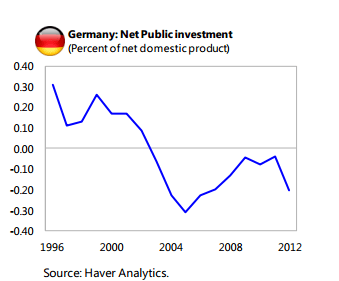Germany dominance over as demographic crunch worsens
(ドイツ:人口危機悪化で覇権も終了)
By Ambrose Evans-Pritchard
Telegraph: 7:58PM BST 01 Jun 2015


(ドイツ:人口危機悪化で覇権も終了)
By Ambrose Evans-Pritchard
Telegraph: 7:58PM BST 01 Jun 2015
Germany's workforce will shrink by 6m over the next 15 years, declining even faster than Japan's
ドイツの労働人口は今後15年間で600万人も減ります。日本より速いっすね。
Germany's birth rate has collapsed to the lowest level in the world and its workforce will start plunging at a faster rate than Japan's by the early 2020s, seriously threatening the long-term viability of Europe's leading economy.
ドイツの出生率が世界的最悪まで爆下げしました。
2020年代初頭までに、労働人口は日本より高速で減り始めるでしょう。
ヨーロッパの主要経済の長期的存続を思いっ切り脅かしています。
A study by the World Economy Institute in Hamburg (HWWI) found that the average number of births per 1,000 population dropped to 8.2 over the five years from 2008 to 2013, further compounding a demographic crisis already in the pipeline. Even Japan did slightly better at 8.4.
HWWIの調査で、人口1,000人当たりの平均出生者数が2008年から2013年までの5年間で8.2人にまで減って、既に進行中の人口危機を悪化させたことが明らかになりました。
日本ですら8.4人と若干マシです。
"No other industrial country is deteriorating at this speed despite the strong influx of young migrant workers. Germany cannot continue to be a dynamic business hub in the long-run without a strong jobs market," warned the institute.
「若手の移民労働者が思いっ切り流入してるのにこのペースで悪化してる先進国なんてないから。ドイツは堅調な労働市場が無くなって、長期的にはダイナミックなビジネス・ハブで居続けらんないよね」とのこと。
The crunch is aggravated by the double effect of a powerful post-war baby boom followed by a countervailing baby bust – the so-called "Pillenknick". The picture in Portugal (nine) and Italy (9.2) is almost as bad.
この人口危機は大戦後の大ベビーブームにこれを相殺する少子化(いわゆる「ピレンクニック」)のダブル効果で酷いことになっています。
ポルトガル(9人)やイタリア(9.2人)の見通しも同じ位真っ暗ですね。
The German government expects the population to shrink from 81m to 67m by 2060 as depressed pockets of the former East Germany go into "decline spirals" where shops, doctors' practices, and public transport start to shut down, causing yet more people to leave in a vicious circle.
ドイツ政府の予想によれば、旧東ドイツの不況地帯が、店舗、医院、公共交通機関が閉鎖されて益々人がいなくなるという悪循環に取り残される「衰退スパイラル」に突入して、人口は2060年までに8,100万人から6,700万人まで減少するとのこと。
A number of small towns in Saxony, Brandenburg and Pomerania have begun to contemplate plans for gradual "run-off" and ultimate closure, a once unthinkable prospect.
ザクセン、ブランデンブルク、ポメラニアにある沢山の小さな町は、段階的「流出」と最終的閉鎖などという、かつては考えることも出来なかった可能性の計画を検討し始めました。
Chancellor Angela Merkel warned in a speech in Davos earlier this year that Germany will lose a net 6m workers over the next 15 years, shrinking gradually over the rest of this decade before going into free-fall.
アンゲラ・メルケル独首相は今年のダボス会議で行ったスピーチの中で、ドイツの労働人口は自由落下に突入する前の2020年までの間に徐々に減少しており、今後15年間に600万人失うことになるとワーニングしました。
The International Monetary Fund expects the decline in the 2020s to be more concentrated – and harder to handle – than the gentler paces of decline seen in Japan so far.
IMFの予想だと、これまで日本で見られているような緩やかな減少よりも、2020年代の減少は強烈(もっと対応が難しい)になるだろうとのこと。
Britain and France are in far better shape, with an average of 12.5 births per 1,000 in from 2008-2013. The IMF expects both countries to overtake Germany in total GDP by the middle of century and possibly even by 2040, implying a radical shift in the European balance of power.
英国とフランスの状況は遥かによく、2008-2013年の1,000人当たりの平均出生者数は12.5人です。
IMFは、両国は21世紀半ばまで、もしかすると2040年までに、総GDPでドイツを抜くかもしれないと予想して、ヨーロッパのパワーバランスがひっくり返る可能性をほのめかしました。
Germany's leaders are themselves acutely conscious that their current hegemonic position in Europe is largely a mirage, certain to fade as more powerful historical currents come to the fore.
ヨーロッパにおける現在の覇権は殆ど蜃気楼のようなものだ、もっと強力な歴史的流れが表面化すれば確実に消えてなくなる、とドイツの指導者達も良くわかっています。
The HWWI said the numbers in the crucial 20-65 age group will drop from 61pc to 54pc by 2030, pushing the dependency ratio towards 1:1 and calling into question the solvency of the public pension system. Life expectancy for women is expected to continue rising to 88 and for men to 84 by the middle of the century, creating a massive social burden.
HWWI曰く、重要な20-65歳のグループの割合が2030年までに61%から54%まで下落して、依存率を1:1まで押し上げ、公的年金制度の支払能力が危ぶまれるとか。
21世紀半ばまでに、女性の平均余命は88歳まで、男性も84歳まで延び続けて、多大な社会負担を生み出すと予想されています。
"We want people to face up to the enormity of the problem," said Dr Andres Wolf, one of the authors of the report.
レポートの執筆者の一人、Andres Wolf博士はこう言います。
「皆にこの問題の重大さをわかってほしいんだな」
"It is a fiscal danger and it is a long-term danger to the ability of German companies to innovate and develop new products," he added.
「財政危機だよ。長い目で見れば、ドイツ企業が技術革新したり新製品を開発したりする能力にとって危険だ」
While ageing societies can enjoy a rise in per capita income for a while, they tend to do so by living off past creativity and intellectual capital. This reserve is exhausted over time. It becomes progressively harder for older countries to remain at the technology frontier.
高齢化社会がしばらくの間、国民一人あたりの所得の上昇を享受出来るのは本当ですが、彼らは過去の創造性やら知的財産でそうする傾向があります。
この「貯金」はいずれなくなります。
高齢化した国が最先端技術を維持することは、どんどん難しくなるわけです。
The HWWI said Germany must open it doors to further immigration of trained workers but fears that it will be a hard sell to voters in the current stormy atmosphere.
HWWIは、ドイツは高技能労働者の移民をもっと受け容れなければいけないと言いつつも、現在の暗雲立ち込める中では、そんなことを有権者に納得させるのは難しいだろうと懸念しています。
The anti-euro Alternative fur Deutschland party (AFD) has broken into several regional parliaments with a hard-line stance against immigrants. There are already almost 10m foreign-born nationals in the country - 12pc of the total – with a further 400,000 migrants are expected this year.
AfDは強硬な反移民姿勢を掲げて、幾つかの地方議会に議員を送り込んでいます。
外国生まれの国民は既に1,000万人近くに達しています(全人口の12%)。
その上、今年中に40万人の移民がやってくると予想されています。
Germany cannot easily turn around the demographic tanker. Academic studies show that fertility rates tend to be structural – caused by deeply-rooted cultural patterns and social systems – and change very slowly in peacetime.
ドイツがこの人口タンカーを方向転換させるのは容易ではありません。
学会の研究によれば、出生率は構造的である(根深い文化的パターンや社会システムを原因とする)傾向があり、平時においては非常に緩やかに変化するとか。
The demographic crisis explains why Germany is so determined to run a budget surplus and drive down its public debt ratios, hoping to avoid a Japanese-style debt-trap before it is too late.
この人口危機は、ドイツが手遅れになる前に日本式の債務トラップを回避しようと、あれほどまでに財政黒字と政府債務比率削減にこだわる理由を説明してくれます。
Whether this is best achieved by austerity is a contentious issue. Budget cuts have led to a negative rate of public investment over the past decade, even though parts of the German canal system, railways and national infrastructure are slowly falling apart.
これを緊縮政策で達成するのが一番かどうかってのは難しいとこです。
予算削減でこの10年間、公共投資がマイナスになってますから…ドイツの運河、鉄道、インフラのあっちこっちが徐々にバラバラになって来てるってのに。
The IMF says Germany would do itself and the rest of the eurozone a favour by spending more to prepare for its old age, not less.
高齢化社会に備えて支出を減らすんじゃなくて増やすことこそ、ドイツにとってもユーロ圏にとっても利益になりますよ、とIMFは言ってます。
























